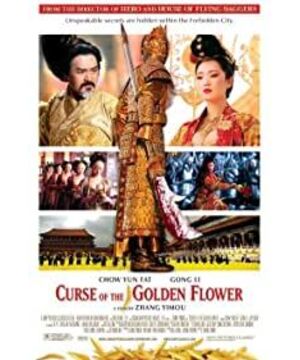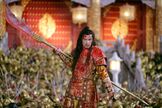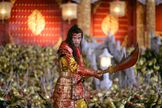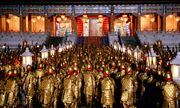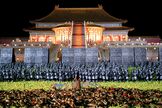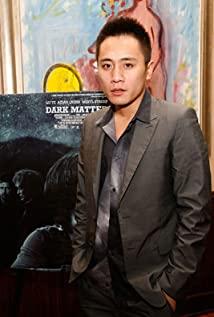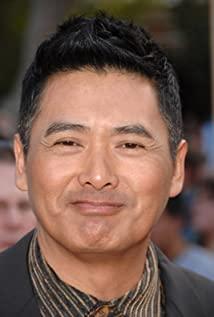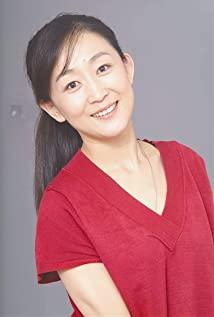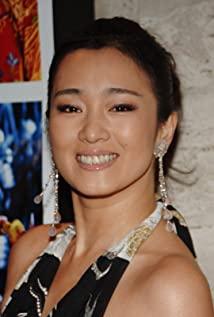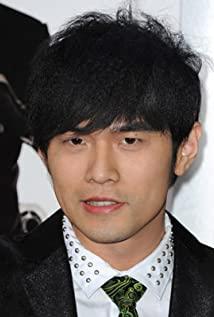"The Banquet" is a practice of Shakespeare, and the "Hamlet" is linked with a meal in China. "The Golden Armor in the City" combines Mr. Cao Yu's "Thunderstorm" with a meal.
The cunning Zhang Yimou, if he really scolds "The Golden Armor of the City" as ruddy, is going to commit a political mistake, and it is by no means as simple as "Hero"'s use of violence to control violence, giving up the mapping of goodwill or far-fetched Related, as far as the movie is concerned, Zhang Yimou's dinner is much stronger than Feng Xiaogang's: the relationship between the characters is complicated, the scene control is grand, the actors perform well, and the climax is ups and downs.
Stergein loves
"Fu Di and Fu Ju"
until autumn comes on September 8th, and I will kill a hundred flowers after the flowers bloom.
The incense in the sky penetrates Chang'an, and the whole city is covered with golden armor.
Finally, Zuo Jian died, Zuo Jian has a lofty and far-reaching life than paper, Huang Chao, Zuo Jian Mr. Cao Yu - adaptation of "Thunderstorm".
As we all know, Mr. Cao Yu is famous for several plays in his youth. When "Thunderstorm" strips away the historical background and only talks about the struggle of human nature, it is the lack of love, so it is not surprising that the eyes are full of cruelty.
In the opening narrative stage, the camera takes a quick cut to highlight "Chrysanthemum and the Sword", the preface to Mr. Ruth Benedict's book "Chrysanthemum and the Sword" outlines the dual character "love" of Japanese culture. Beauty and martial arts, polite and aggressive, new and stubborn, obedient but unruly..." It is exactly in line with this group of shots and the overall theme, so the director's ingenuity is a jerky reference, not Zhang's innovation And plagiarism.
"Chrysanthemum" is the family emblem of the Japanese royal family, and "knife" is a symbol of samurai culture. The "Iga Ninja" flying all over the sky thinks that Akira Kurosawa is possessed and revived, strengthening the exotic visual effect, but the love between the characters is alienation and harmony. Hysterical.
The emperor is the embodiment of the regime, and for power and rules, there is a sinister plot of murdering the family from the stock. The queen's possession of the eldest prince's selfish desires hysterically murdered her husband and asked for it. The eldest prince, enjoy round after round of various relationships, the fearless entertainment spirit of the old lady and the younger sister. The second prince, killing the father, this ancient plot seems to be the best understandable. The little prince's role is a little less, and the original plot of secret love for Sifeng seems that the director has no time to take into account the crazy lore. As for Jiang's and Xiaochan's props, it's a bit out of common sense. After all, there are so many characters and so many relationships. It's hard to describe in just one episode. You can use prequels, postquels, etc., to explain the relationship clearly.
Looking at the etiquette of loyalty and filial piety in this family, Mrs. Zhang thoroughly interprets Freud's family view: the ending of most marriages is spiritual disappointment and physical deprivation... The spirit of
Spirit
is important for "The Golden Armor in the City" , Zhang's martial arts is the most telling story, to be precise, it is the most telling story with visual effects, and his story will always be thin and incomplete.
"Thunderstorm" mainly relies on the background of the times. The screenwriter weakens a specific time period, and the tension of the original drama is greatly limited. In the cruelty of human nature in "Thunderstorm", we can vaguely see hope and expectation that all forces will trigger revolution and destruction. later rebirth.
"The Golden Armor in the City" moves the background to the end of the Tang Dynasty. The story naturally accumulates the gloomy human nature into the final cruelty, and there is no hope and spiritual inheritance. This depression has no chance to be released until the subtitles appear. So what about art? Could it be Zhang's fascination with power, the "world" of "Hero" and the "rules and circles" of "Golden Armor in the City", the servile side has become an irreplaceable theme.
Servility is slavish
color, and it is deliberately intensifying the visual impact of color, which is already Zhang Yimou's usual method. As a result, Zhang Yimou's films have transformed into emblem-like, modular, and fake theater-like.
The small theater performance mode is marked by the court timekeeping. Zi Chouyin and Jay Chou push the climax with big swords. From the struggle of the little characters in "A Case of Qiu Ju" to the servility of the big characters in "The Golden Armor of the City", we seem to be groping. To the future direction of Zhang's films - to clean up the expectations of the kind audience, after trampling on the song and dance, the song and dance became peaceful.
We were once wandering in the misunderstandings, once pinned on Chen Kaige and Zhang Yimou, a generation listened to the stories of complaints and struggles, but what we saw was the extreme cruelty. … (Text/Changyou Four Hospitals)
View more about Curse of the Golden Flower reviews


